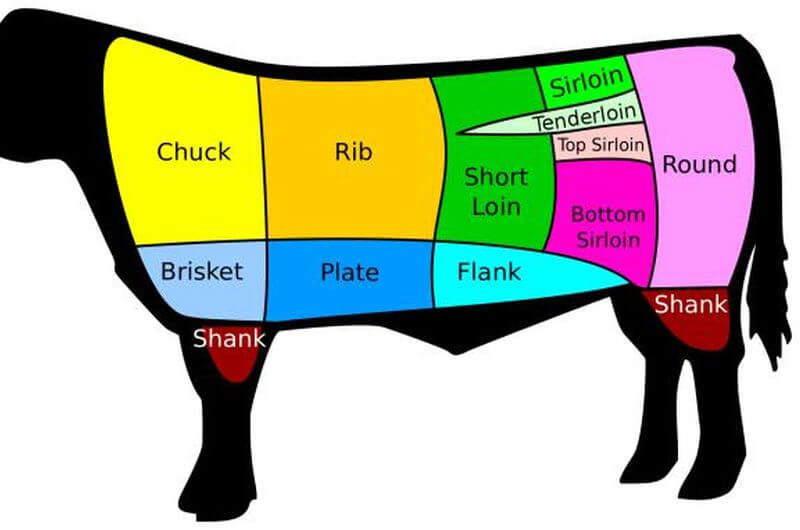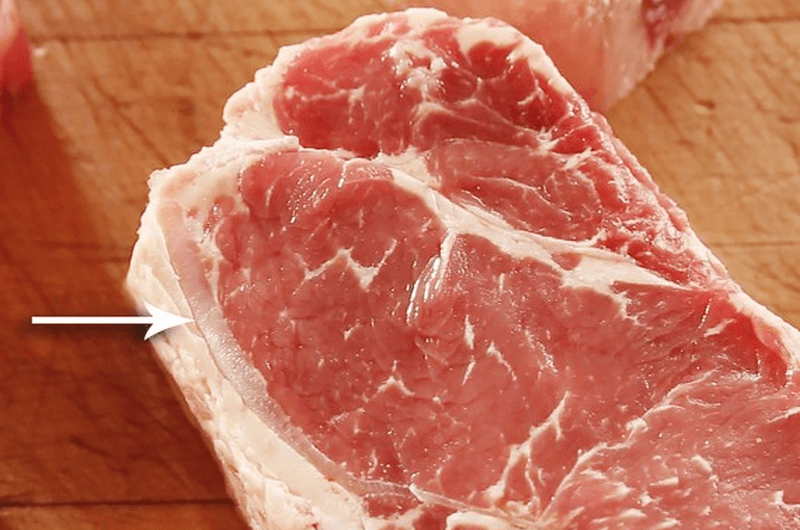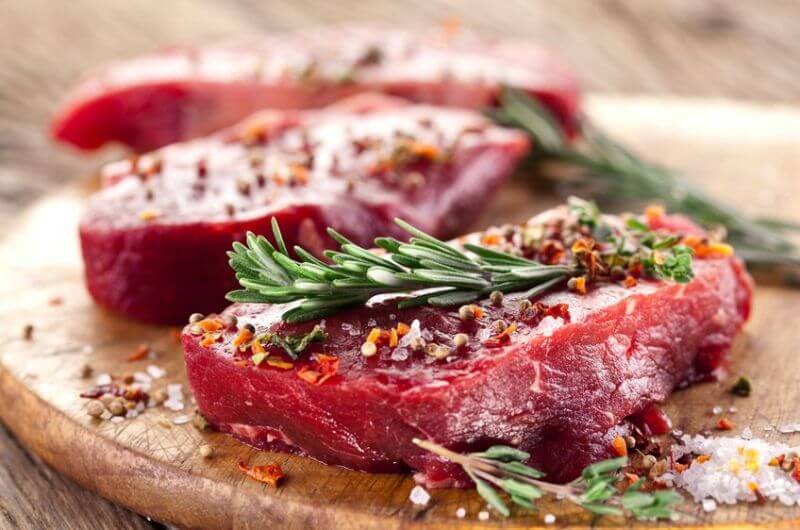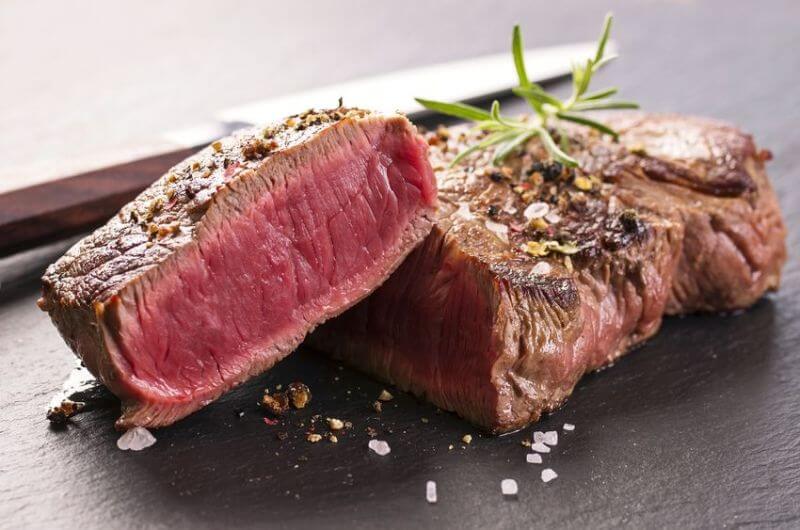Quarantine Cuisine: 30 Healthy Recipes You Can Easily Make at Home Right Now
Who knew quarantine cooking could be so tasty?
When you’re craving something savory, few foods scratch that itch like steak.
A properly cooked steak, that is.
You know, one that bursts with flavor in every warm and tender bite.
Well, that’s what this article is going to be all about: how to cook a steak like an accomplished chef.
And don’t worry — you don’t have to actually be an accomplished chef to pull it off.
In fact, you don’t need any special knack for cooking whatsoever. All you need to do is follow the simple steps outlined below.
Let’s get to it.

The first step to cooking the perfect steak is choosing the perfect steak.
And that means knowing your way around the many different cuts, like flank, porterhouse, loin, skirt, ribeye, strip, and so forth.
If it’s a cut from the leg, it’s going to be tougher than a cut from the mid section, which is where the most tender meat is found.
For example, the two steaks on the menus of all fancy steakhouses — ribeye and strip — come from the rib and short loin sections of the cow, respectively.
Look for USDA Prime, USDA Choice, or USDA Select.
If those are too pricey, don’t worry — you can still make a fantastic steak with ungraded meat.
Thin steaks tend to overcook before they can develop that crispy, delicious crust that we all love.
I like to go with steaks that are about an inch and a half thick, which ends up weighing around 12 ounces.
(If that’s too much meat for you, remember it’s better to cook one large steak for two than a couple smaller ones.)
When freshly cut meat is first exposed to oxygen, it’s bright red, and as it remains exposed, it takes on shades of brown.
While this makes it look less less appealing, it doesn’t necessarily affect taste.
More important is the color of the fat. You want to see white marbling and no brown spots in the fat or around the edges.
“Marbling” refers to the streaks of fat found throughout the meat.
Super-lean cuts of steak are great for controlling your calories, but not so great for making a mindblowing steak.
There’s a reason steakhouses always choose cuts with more marbling — it makes for juicy, succulent steak with rich, deep flavor.
What you want to look for is evenly dispersed flecks of fat throughout the meat, rather than big chunks here and there.
This is going to give you the tenderest and tastiest steak.
Don’t mistake connective tissue — sinewy tendons and ligaments — for marbling, because it makes for tough, chewy bites.
Connective tissue is easy to spot because it runs through the meat from one side to the other, separating it into distinct regions.
 This “gristle” is very hard to chew and not nearly as tender as as “center cut” steak like the one at the top of the picture.
This “gristle” is very hard to chew and not nearly as tender as as “center cut” steak like the one at the top of the picture.
If you want the freshest and best-tasting meat, go with a butcher.
If that’s too much of a hassle, though, here’s what you should keep in mind when buying steak in a grocery store:

You’ve probably heard that the first thing you should do before cooking a steak is let it sit at room temperature.
This won’t hurt, but I wouldn’t bother because a thick steak will take several hours to rise to room temperature and it doesn’t really make much of a difference tastewise.
How you salt the meat matters, however, is important.
When salt first hits the meat, it begins drawing liquid out, and after about twenty minutes, a large amount of the moisture naturally present will be pooled on top of the steak.
This is the worst time to cook it because the droplets will evaporate off, leaving you with a tougher, stringier steak than you’d like.
Better, then, is either salting 40 to 60 minutes or directly before cooking.
Most people prefer the former over the latter, and some chefs even like to salt and season their meat a few days in advance, giving it time to reabsorb all its juices.
Also, some chefs prefer kosher salt because its larger, coarser grains do a better job sucking moisture out than table salt.
You can pan fry, grill, broil, slow cook, braise, and even bake steak.
My preferred choices are pan frying and grilling, though, because they’re the fastest way to get the job done.
Here’s how to get the most out of both methods:
Before getting started, first consider your preferred doneness.
If you’re like me and you want maximum tenderness and flavor, then you want your steak cooked medium rare.
And unless you absolutely must have yours fully cooked through, don’t go further than medium (the closer you get to well done, the more your steak is going to resemble shoe leather).
Now, you can assess the doneness of your steak in two ways.
First, you can go by temperature:
This requires a meat thermometer, of course.
Second, you can use your hands. Here’s how to do it:
Ironically, this doesn’t work as well for those of into weightlifting because, well, our hands are too swole.
If you’re in that boat, then you can still use the finger test with some trial and error — simply experiment with touch testing and checking doneness and within a few steaks, you’ll have “calibrated” to your hands.
You can make equally good steaks in a pan and on the grill.
People have their preferences, though, so you’ll have to try both methods and see which best strikes your fancy.
If you want the best results in a skillet, go with a cast iron one.
These thick, heavy pans are designed to retain heat for a long time, which makes easy and effective searing.
Also, when you’re cooking a steak in a pan, add a generous amount of oil first (I prefer olive oil over vegetable) — 3 to 4 tablespoons should be enough — and not butter, because butter will burn at the heat levels needed to cook a great steak.
Now, the first step to actually cooking your meat is getting the pan/grill hot.
You know it’s hot enough when water drops sizzle and evaporate immediately on contact.
This is important because when the meat hits the cooking surface, you need it to seal and retain its juices, and that requires a high heat.
Steaks requires 2 to 4 minutes per side, depending on the how lean and thick the meat is and how done you want your steak to be.
As you know, the key is touch testing as it cooks.
You should also flip your steak often (once every 15 to 20 seconds), which helps it cook faster and more evenly and develop a better crust.
(And yes, you can use a fork to flip it — a steak isn’t a balloon that will lose all of its liquids once punctured.)
If you’re cooking in a pan, basting regularly is an important part of cooking a great steak.
By spooning the hot liquids over the top of the steak each time you flip it, it helps prevent burning and speeds up the cooking time considerably.
And speaking of basting, if you want to add butter or spices to the pan, do so a few minutes before the steak is done cooking and baste liberally.
It’a also important to undercook your steak slightly because when you remove it from the pan to rest (the next step), it continues to cook.
If you cook it to the perfect doneness and then rest it, it’ll be too cooked.
This is one of those little cooking “tricks” that make a bigger difference than you might think.
Once you’ve finished (slightly under-) cooking your steak, put it on a plate, cover it with foil or a bowl, and let it rest for 10 to 15 minutes.
This really seals in the juices and makes for a maximally satisfying meal.
If you want your steak to be as hot as possible when served, heat the plate first.
Congratulations, you’ve just made one sexy steak!

To avoid bacterial growth, you’ll want to place them in an airtight container or wrap them tightly in foil or plastic wrap within 2 hours of cooking and store them for no more than 4 to 5 days. (Once it gets sticky or smelly, it’s bad.)
You can freeze cooked steak in the same way, but make sure it’s completely airtight to avoid freezer burn.
If you’ve reheated meat incorrectly, you know what you wind up with:
A juiceless hockey puck that damn near breaks your jaw.
Do it right, though, and you can thoroughly enjoy your steak even though it’s not fresh.
The first rule is the microwave is verboten. It just makes crappy steak.
Do this instead:
The goal here is cooking them until they’re heated through to center, but not more. (If you’re using a thermometer, go for about 110°F in the center.)
If that’s just too much work for you, do this:
Butterfly the steak, heat a skillet, and fry both sides of the now-thinner meat for about a minute each.
If you like steak but haven’t been given much thought about how you choose, prepare, and cook it, you’re in for a delicious surprise.
There’s a huge difference between poorly-chosen, prepared, and cooked meat, and what you’ve just learned to create.
To recap:
Do all that and I promise that you’ll be whipping up the perfect steak for your lunches and dinners.
Enjoy!
Who knew quarantine cooking could be so tasty?
Use this weight loss calculator to learn how many calories you should eat to lose fat in less than 60 seconds.
If you’re looking for easy, fast, and delicious high-protein meals, then you’re going to love t...
What is a "skinny fat" physique, what causes it, and how do you get rid of it? Find out here.
Take our 60-second quiz now to learn which supplements can help you achieve your fitness goals faster.
Take the Quiz No thanks, I don't want help choosing supplements."I never thought getting in shape would be this simple! Everything just WORKS when you follow this plan." And if he can do it, why not you?
Take the Quiz No thanks, I don't want to lose weight or build muscle.Not happy with your purchase?
Simply let us know, and you'll get a full refund, no questions asked. And you don't even need to return anything.
So that means you can say "yes" now and decide later.
Why do we have a $65 free shipping threshold?
Because shipping a single item is surprisingly expensive.
So blasted expensive, in fact, that on a small order, the shipping cost alone can eat up all of the profits.
However, the economics change dramatically when you bundle, because adding a second or third item to your order costs us very little extra to ship.
And once your order hits the $65 mark (a few items), the math works out, and we can cover the entire shipping cost for you.
Why the $199 minimum purchase amount for free shipping?
To quench our piggish lust for grubby profits in the eternal service of the dread lord Mammon?
Kind of. But not really. Because here's the truth:
Single-item orders are so blasted expensive to ship that we make very little profit on them. And no profits make the bean counters lose their marbles.
But when you order just one more item, it only costs us a few dollars more to ship both of them to you. Add a third item, and it's just a few more shekels to ship.
And that allows us to make a profit. Which keeps the bean counters happier than a hammer in a nail factory.
So, if it pleases your Grace, we humbly request your mercy and patronage notwithstanding the vexing free shipping minimum.
Why the $299 minimum purchase amount for free shipping?
To quench our piggish lust for grubby profits in the eternal service of the dread lord Mammon?
Kind of. But not really. Because here's the truth:
Single-item orders are so blasted expensive to ship that we make very little profit on them. And no profits make the bean counters lose their marbles.
But when you order just one more item, it only costs us a few dollars more to ship both of them to you. Add a third item, and it's just a few more shekels to ship.
And that allows us to make a profit. Which keeps the bean counters happier than a hammer in a nail factory.
So, if it pleases your Grace, we humbly request your mercy and patronage notwithstanding the vexing free shipping minimum.
Split your entire online purchase into 4 interest-free payments, over 6 weeks with no impact to your credit.

25%
today
25%
2 weeks
25%
4 weeks
25%
6 weeks

Shop and add items to your cart as normal!

Choose Sezzle at Checkout! You’ll be redirected to Sezzle to Sign Up or Log In to complete your order.

Your order will be shipped out right away* and your payments will be split up over 6 weeks.
*shipping times subject to merchant shipping policy
Shop directory. Reschedule payments. Plus more!
In consideration of the services and/or products offered by Legion Athletics, Inc. (“Legion”) including, but not limited to, nutrition plans, exercise routines and coaching, and in addition to the payment of any fee or charge:
I knowingly and voluntarily enter into this waiver and release of liability and hereby waive any and all rights, claims or causes of action of any kind whatsoever arising out of my use of Legion’s services and/or products, and I hereby release and hold harmless Legion and its consultants, officers, contractors, agents, owners and employees from any and all responsibility, liability, cost and expenses, including for injuries, damages or disorders (physical, metabolic, or otherwise), resulting from my use of Legion’s services and/or products.
I understand that fitness activities including, but not limited to, strength, flexibility, and cardiovascular exercise, with or without the use of equipment, are potentially hazardous activities that involve a risk of injury and even death, and I am voluntarily participating in these activities and using equipment and machinery with knowledge of the risks involved. I hereby agree to assume and accept any and all risks of injury or death related to said fitness activities.
I understand Legion’s services and products are not meant to treat or manage any health conditions or circumstances, and I acknowledge that Legion has recommended I obtain a healthcare provider’s approval for my use of Legion’s services and/or products, through regular physical examination(s) and/or consultation. I acknowledge that I have obtained my healthcare provider’s approval or have decided to use Legion’s services and/or products without such approval and hereby assume all responsibility for my use of said services and/or products.
I understand that results from using Legion’s products and/or services are not guaranteed, and I agree to not hold Legion liable for any outcomes or lack thereof.
Please click the checkbox below. We apologize for the inconvenience.
Legion's content is fact-checked and reviewed by a team of scientific, medical and subject-matter experts to ensure everything we publish is evidence based, trustworthy, and current.
Meet our Scientific Review Board Review our Editorial ProcessOur scientific review board of nutritionists, dietitians, molecular biologists, doctors, and other accredited experts is responsible for reviewing every article, podcast, and video we produce to ensure they’re evidence based, accurate, trustworthy, and current.
Thanks to their connections, credentials, and academic experience, this team of MDs, PhDs, and other professionals has access to a wealth of research published in the largest and most prestigious journals in the world.
This allows them to not only review individual studies but also analyze the overall weight of the evidence on any and all topics related to diet, exercise, supplementation, and more.
If you feel that any of our content is inaccurate, misleading, out-of-date, or anything less than factual, please let us know in the comments section of the article in question.
We follow a detailed, rigorous, multi-step process to create content that meets the highest standards of clarity, practicality, and scientific integrity.
First, our research associates provide our editorial team with accurate, up-to-date, proven scientific evidence.
Then, our editorial team uses this research to draft articles and outlines for podcasts and videos.
Finally, our scientific review board reviews the content to ensure all key information and claims are backed by high-quality scientific research and explained simply and precisely.
If you feel that any of our content is inaccurate, misleading, out-of-date, or anything less than factual, please let us know in the comments section of the article in question.